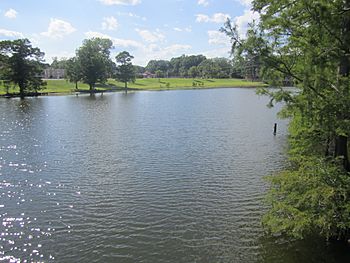Bayou Desiard facts for kids
Quick facts for kids Bayou Desiard |
|
|---|---|

Bayou Desiard in Monroe, Louisiana
|
|
| Country | United States |
| Location | Louisiana |
| Physical characteristics | |
| Main source | Bartholomew Lake, Black Bayou Lake and Mill Bayou |
| River mouth | Ouachita River Monroe, Louisiana 32°33′14″N 92°07′30″W / 32.5538°N 92.1251°W |
| Length | 28 mile length |
| Basin features | |
| River system | Arkansas River, Ouachita River |
| Basin size | 21,349 acres |
Bayou Desiard is a beautiful waterway, often called a bayou, located in Louisiana, USA. It flows through two parishes: Ouachita Parish, Louisiana and Morehouse Parish, Louisiana. This bayou gets its water from Bartholomew Lake, Black Bayou Lake, and Mill Bayou. It even runs right through downtown Monroe, Louisiana and past the campus of the University of Louisiana at Monroe. You can find the Bayou Desiard Bridge crossing over it in Monroe.
History of Bayou Desiard
Originally, Bayou Desiard was part of an old channel of the Arkansas River. It used to get water from the Ouachita River. But in 1935, an earthen wall, called a levee, was built. This levee changed the water's path. Now, the water flows from Bartholomew Lake into Bayou Desiard.
To help manage the water, the Louisiana government created a special group. On July 13, 1962, the Bayou DeSiard-Bayou Bartholomew Cut-Off Loop Water Conservation Board was formed. Their job is to build structures and control the water levels in the bayou. This helps keep the water just right.
What Bayou Desiard is Used For
Bayou Desiard is super important for the city of Monroe. It's the main source of drinking water for the city! The city also manages the bayou to help prevent floods.
But it's not just for drinking water and flood control. The bayou is also a fun place for many activities:
- Fishing
- Duck hunting
- Boating
- Water skiing
The University of Louisiana at Monroe has both a water ski team and a fishing team that use the bayou for practice and competitions. Every year, a special event called the Bayou DeSiard Dragon Boat Festival is held right on the bayou. It's a colorful and exciting race!
Plants and Trees Along the Bayou
Bayou Desiard is home to many interesting plants and trees. At the northern end, you'll find lots of tall bald cypress trees. These trees are famous for growing in water. As you move south, you'll see fewer cypress trees, but they are still around. You can also spot water tupelo trees, which also love wet areas.
The surface of the water often has floating plants like:
- Duckweed (tiny green plants that cover the water)
- Water hyacinth (pretty purple flowers that float)
- Eichhornia crassipes (another type of water hyacinth)
Underneath the water, there are submerged plants, meaning they grow completely underwater. These include:
- Coontail
- Fanwort
- Elodea
- Southern naiad
These plants provide homes and food for many animals living in the bayou.
 | Dorothy Vaughan |
 | Charles Henry Turner |
 | Hildrus Poindexter |
 | Henry Cecil McBay |

